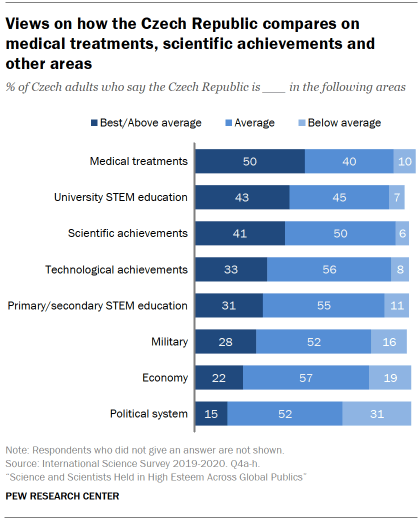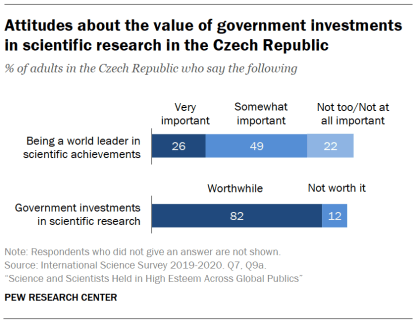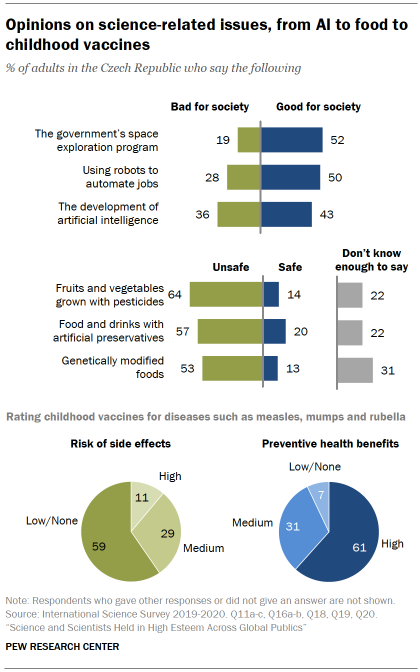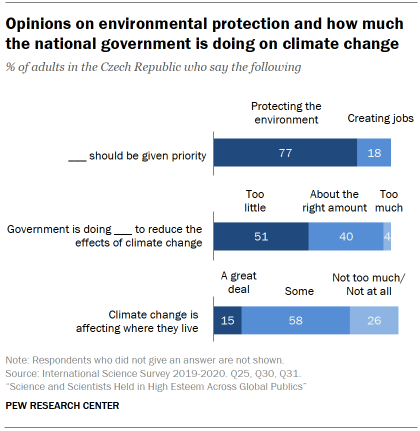This roundup of findings shows public views about science-related issues and the role of science in Czech society. The findings come from a Pew Research Center survey conducted across 20 publics in Europe, the Asia-Pacific, Russia, the U.S., Canada and Brazil from October 2019 to March 2020.

Ratings of medical treatments, scientific achievements and STEM education in the Czech Republic
Majorities in most of the 20 publics surveyed saw their medical treatments in a favorable light on the eve of the global pandemic. Medical treatments were often seen more favorably than achievements in other areas.

Across the 20 publics, a median of 59% say their medical treatments are at least above average. In the Czech Republic, half think their country’s medical treatments are the best in the world or above average. Only one-in-ten Czech adults think their medical treatments are below average.
Overall, 43% of Czechs say their country’s university STEM education is at least above average. A smaller share thinks their primary and secondary STEM education is the best in the world or above average (31%). About four-in-ten (41%) say the Czech Republic’s scientific achievements are above average or the best in the world, and one-third (33%) think the Czech Republic’s technological achievements are at least above average.

Majorities in all publics agree that being a world leader in scientific achievement is at least somewhat important, but the share who view this as very important varies by public. A 20-public median of 51% place the highest level of importance on being a science world leader. In the Czech Republic, only 26% of people say being a world leader in scientific achievements is very important, the second lowest share of the 20 survey publics.
Overall, there is broad agreement among these 20 publics that government investment in scientific research is worthwhile. A median of 82% say government investments in scientific research aimed at advancing knowledge are usually worthwhile for society over time. In the Czech Republic, the same share (82%) says this.

Views on artificial intelligence, food science and childhood vaccines in the Czech Republic
Majorities in most publics see their government’s space exploration program as a good thing for society. Across the 20 publics, a median of 72% say their government’s space exploration program has mostly been a good thing for society. In the Czech Republic, more say the European Space Agency’s space exploration program has been good than bad for society (52% vs. 19%); a sizable minority say they don’t know, refused or say it’s been both or neither (29%).

Public views on artificial intelligence (AI) and using robots to automate jobs are more varied from public to public. A median of 53% say the development of AI, or computer systems designed to imitate human behaviors, has mostly been a good thing for society, while 33% say it has been a bad thing. The Center survey also finds that publics offer mixed views about the use of robots to automate jobs. Across the 20 publics, a median of 48% say such automation has mostly been a good thing, while 42% say it has been a bad thing.
In the Czech Republic, people have mixed views about the development of AI: 43% say artificial intelligence has been good for society, while 36% say it has been bad. Opinions about the effect of workplace automation through robotics are slightly more positive: 50% say it has been a good thing, while 28% say it’s been a bad thing.
Across most of the publics surveyed, views about the safety of fruits and vegetables grown with pesticides, food and drinks with artificial preservatives, and genetically modified foods tilt far more negative than positive. About half think produce grown with pesticides (median of 53%), foods made with artificial preservatives (53%) or genetically modified foods (48%) are unsafe. Czechs are similarly skeptical. In the Czech Republic, only 14% say fruits and vegetables grown with pesticides are safe, while 64% think they are unsafe, and 22% say they don’t know enough about this issue to say. A majority of Czechs (57%) say food and drinks with artificial preservatives are unsafe to eat, and 53% say genetically modified foods are unsafe.
When it comes to childhood vaccines such as the measles, mumps and rubella (MMR) vaccine, a median of 61% say the preventive health benefits of such vaccines are high, and a median of 55% think there is no or only a low risk of side effects. About six-in-ten Czechs say the preventive health benefits from the MMR vaccine are high (61%); 59% rate the risk of side effects from the MMR vaccine as low or none.

Views on climate and the environment in the Czech Republic
Majorities across all 20 survey publics would prioritize protecting the environment, even if it causes slower economic growth. A median of 71% would prioritize environmental protection. In the Czech Republic, about three-quarters (77%) think protecting the environment should be given priority, even if it causes slower economic growth and some loss of jobs. A far smaller share (18%) thinks creating jobs should be the top priority, even if the environment suffers to some extent.
Public concern about global climate change has gone up over the past few years in many publics surveyed by the Center.

Majorities in all 20 publics say they are seeing at least some effects of climate change where they live. A median of 70% say they are experiencing a great deal or some effects of climate change where they live. In the Czech Republic, about three-quarters (73%) say climate change is affecting where they live a great deal (15%) or some (58%).
A 20-public median of 58% say their national government is doing too little to reduce the effects of climate change. About half in the Czech Republic say their government is doing too little (51%) to reduce the effects of climate change, while 40% say the government is doing about the right amount, and just 4% say it is doing too much.
Find out more
Read the full report online.
All surveys were conducted with nationally representative samples of adults ages 18 and older. Here is the survey methodology used in each public.